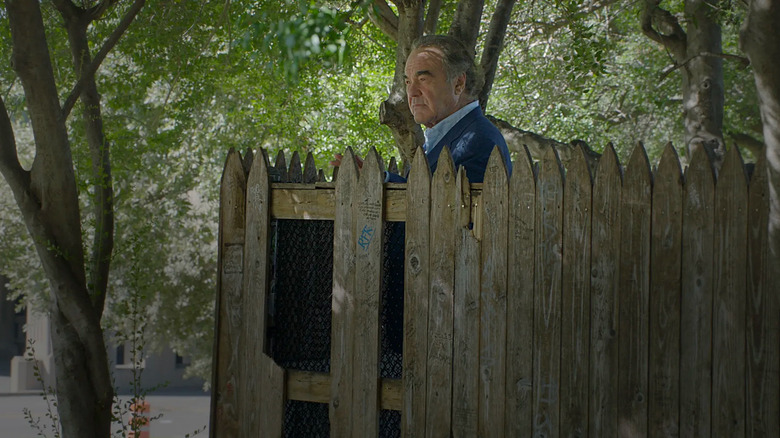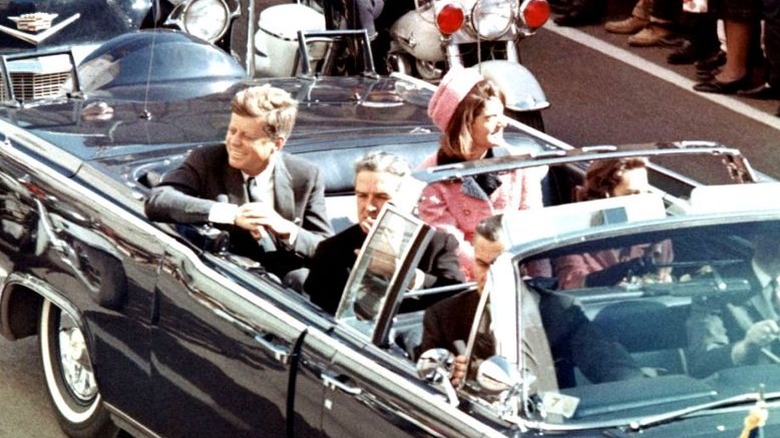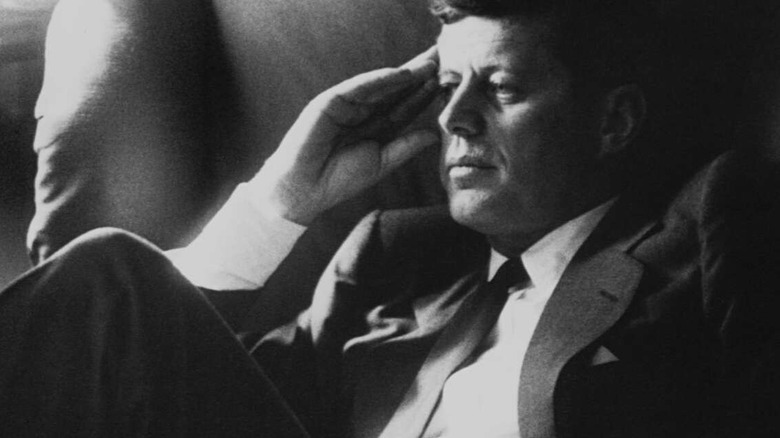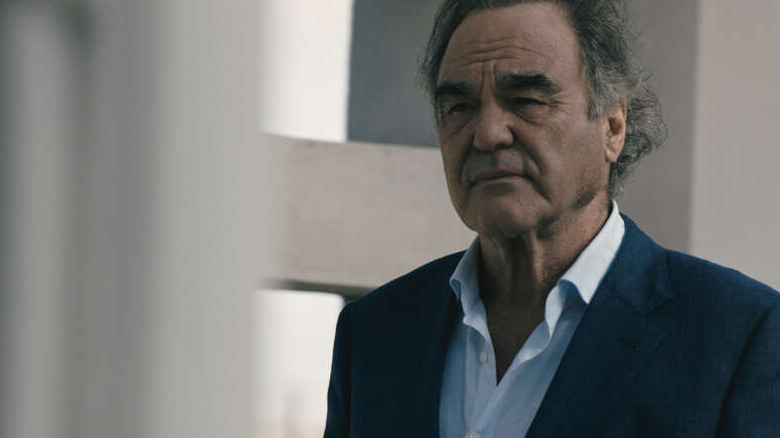JFK Revisited: Through The Looking Glass Review: Oliver Stone Keeps The Conspiracy Theories Coming In A New Documentary
"JFK" is arguably Oliver Stone's best film. A sprawling, star-studded, brilliantly crafted bit of paranoia, Stone's 1991 deep dive into the seemingly endless conspiracy theories surrounding the assassination of President John F. Kennedy has the rare distinction of being a film that inspired legislative change. The buzz surrounding Stone's movie was so strong that it directly lead to the President John F. Kennedy Assassination Records Collection Act of 1992, which established the collection of all U.S. records regarding Kennedy's assassination to be housed in the National Archives. As a result of this, for the first time ever, a treasure trove of documents surrounding the assassination was collected under one roof and made available to the public.
These records serve as a kind of jumping-off point for Stone's new documentary, "JFK Revisited: Through the Looking Glass," a kind of spiritual sequel to "JFK." As Stone tells us at the start of the doc, the release of these records resulted in even more info coming to light — info he didn't have while making "JFK." Now, he's able to keep the story going, and expand on details he presented back in 1991. But the result is the same: Stone remains convinced there was some sort of vast conspiracy at work behind Kennedy's assassination, and he'll never stop digging for the truth.
And what is the truth? Ah, well, that's a slippery thing. I personally think Stone's 1991 "JFK" is a masterpiece. From a filmmaking standpoint alone, it's a staggering work, employing incredible editing (the filmmaker had a whole team of editors cutting the massive film together) and constantly shifting cinematography (courtesy of Robert Richardson) all in the name of conveying a lot of information. If you step back from the filmmaking and the cavalcade of familiar faces, you start to realize "JFK" is little more than scene after scene of people sitting in rooms talking, and talking, and talking. Page after page of exposition unfurls throughout the course of the film's 188-minute runtime, but it never gets boring, because Stone is such a damn good filmmaker and he knows exactly how to make all this info seem cinematic.
That said, I also think "JFK" is a bunch of B.S. I'm not going to sit here and tell you I know exactly what happened that day in Dallas on November 22, 1963, but I can tell you that a lot of what Stone presents in his film has been twisted and significantly altered in order to get the point across. Much of the movie has also been debunked. It doesn't help matters that Stone chose New Orleans D.A. Jim Garrison, played by Kevin Costner, as his movie's hero. By all accounts, Garrison was wildly corrupt, and Stone's decision to turn Garrison into a bastion of truth begins to feel icky the more you learn about the real man. Stone, to his credit, seems to be aware of this now, because Garrison is only mentioned once, very briefly, in this new documentary. The same goes for Clay Shaw, the figure played by Tommy Lee Jones in "JFK," and theorized by the film to be involved with the plot to kill Kennedy. Garrison took Shaw to trial for this, and Shaw was acquitted (primarily because Garrison's case against him was, to be blunt, non-existent).
No Satisfying Answers
Will we ever have a satisfying answer as to who killed JFK? Probably not. You either believe Lee Harvey Oswald acted alone, or you believe there was some sort of conspiracy. A treasure trove of books have been published offering conspiracy theories, but there are also plenty of books that debunk them. I'll confess that for a while there I was pretty sure a conspiracy was involved, primarily because I was basing most of my knowledge of the matter on Stone's "JFK." In the years since, though, I've come around to thinking Oswald acted alone. The books "Case Closed," by Gerald Posner, and "Reclaiming History," by Vincent Bugliosi, both do excellent jobs of destroying practically any conspiracy theory you can think of while also making it pretty clear that yes, Oswald acted alone. But of course, there will always be some doubt. And if you're the type of person who remains convinced of a conspiracy, I certainly can't fault you. After all, the root of any conspiracy surrounding the assassination is in the fact that the United States government is often willfully corrupt and prone to lying through its teeth. To say Lee Harvey Oswald acted alone is almost tantamount to saying you support the nefarious CIA, and no one wants to do a thing like that. I sure don't!
The problem is that conspiracy theories in general, once on the fringes, have seeped into the mainstream thanks to the Trump era, where the former president himself was fond of jumping on Twitter and firing off countless easily debunked conspiracy theories that his supporters nonetheless devoured whole. And then there's the increasingly unhinged Qanon movement, which feeds off the same type of wild speculation and disinformation. There's a fine line to walk here. We should be suspicious of our government. We shouldn't take them at their word. But we also shouldn't start believing in secret cabals of pedophile cannibals who run Hollywood and the Democratic Party. I'm not saying Stone believes in that sort of madness, but it's very easy to stumble into that world when you start going down this road.
The world of JFK conspiracies is labyrinthine, and trying to keep track of it all can turn one into a real version of that "It's Always Sunny in Philadelphia" meme (you know the one). Stone's new documentary is handsomely made, and the filmmaker is still adept at crafting a compelling narrative from all of this. Still, after a while, "JFK Revisited: Through the Looking Glass" begins to grow almost annoyingly complicated, with Stone breathlessly jumping from one theory to the next. How can you even begin to parse all of this out?
The Magic Bullet
None of this is to say there aren't lingering questions. Even if you accept that Oswald acted alone, there are still little details that don't add up. And when you start to compile those details in one package, as Stone does here, you start to suspect foul play. Conspiracy theories surrounding Kennedy's murder began almost immediately, even before Oswald was in custody. In an attempt to soothe the public's fears, Lyndon Johnson ordered an investigation into the assassination. The official name for the group looking into the assassination was the President's Commission on the Assassination of President Kennedy, but it quickly became known as the Warren Commission, named after commission chairman, Chief Justice Earl Warren. The commission's findings, the 888-page Warren Report, concluded that Oswald acted alone. But in the years since it's become clear that the commission overlooked some details. On top of that, when members of the CIA were questioned for the report, they were not exactly honest. That doesn't mean the CIA killed Kennedy, mind you. It just means they've done a lot of other awful stuff they don't want getting out there.
Stone structures "JFK Revisited" into two distinct parts, a decision that makes the documentary feel like a docuseries that was cut together into a feature. The first hour of the film focuses on the assassination and what came after, including the controversial autopsy on the late president. This segment, narrated by Whoopi Goldberg, is the most compelling section. Even if you don't subscribe to what Stone is selling here, you have to admit he does a good job laying things out. Much is made of the so-called "magic bullet," a single bullet that the commission concluded resulted in several different wounds in both Kennedy and Texas Governor John Connally, who was also shot during the assassination. Taken at face value, it sounds silly that one bullet can do all that damage. However, when you start to dig into the explanation it actually does start to make sense. Stone, however, doesn't bother bringing that up.
To his credit, he does have Goldberg offer some alternate, innocent explanations to some big questions. Perhaps the filmmaker knew he'd be accused of not playing fair, and thus threw these brief moments in. Perhaps not. In any case, it's clear that Stone refuses to accept any explanation that doesn't point towards conspiracy.
Through The Looking Glass
The second half of the film brings in a new narrator in the form of Donald Sutherland. Sutherland appeared in Stone's "JFK" as a mysterious military man named "X," a character who shows up more than halfway through the film and drops an exhausting amount of info on both star Kevin Costner and the audience. That segment played out mostly with Sutherland talking over archival footage, and that's what happens here, too, making the entire second half of the film feel like a continuation of that "JFK" scene.
This part of the film is more concerned with not how Kennedy was killed, but why Kennedy was killed, at least according to Stone. And the bottom line is that Kennedy was a danger to the military-industrial complex. There's a belief that Kennedy would've never gone into Vietnam like his successor Lyndon Johnson, and the warmongers in the government couldn't stand for that. Of course, we'll never really know how Kennedy would've handled Vietnam. There's plenty of reason to believe that he might not have allowed America to enter the war, but there's just as much reason to think the opposite (here's a pretty detailed article that posits both theories).
"JFK Revisited" rushes through this section, which hinders the entire film. Stone spends so much of the first hour talking about the minutia of ballistic and autopsy reports only to then take a speedrun through this second half, creating a kind of lopsided narrative. In the end, "JFK Revisited" starts to feel less like its own thing and more like supplementary material that could be included on a future "JFK" Blu-ray release. Still, Stone's filmmaking talent can not be denied, and it's hard to argue with his bottom-line conclusion that governments — especially our government — lie all the damn time, without impunity. But at this point, the world of JFK conspiracy theories has gone from the search for facts to a question of faith. We may never have the truth, but like Fox Mulder on "The X-Files," Oliver Stone wants to believe.
/Film Rating: 6.5 out of 10
JFK Revisited: Through the Looking Glass is now in select theaters, and will stream on Showtime on November 22, 2021.



